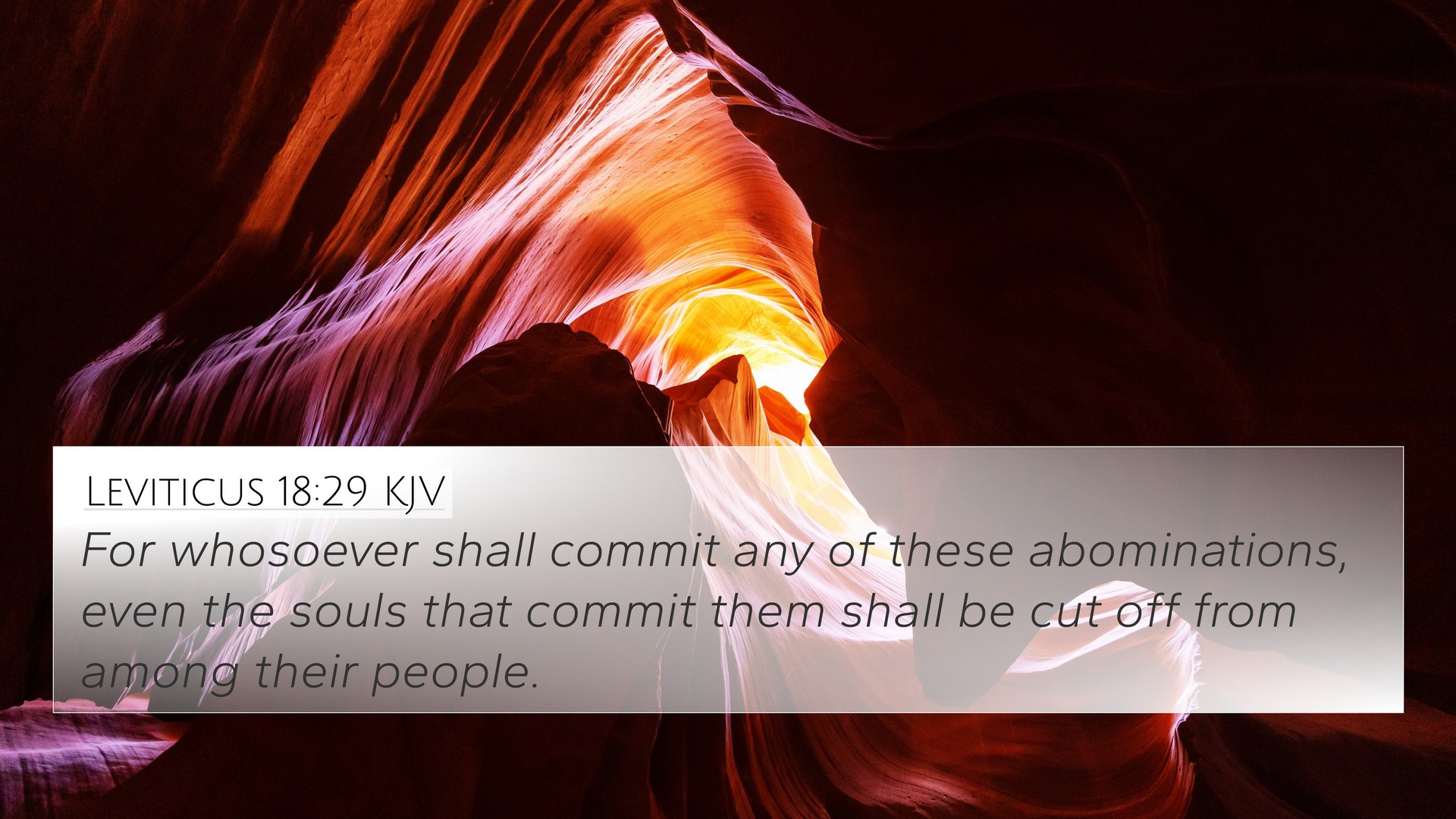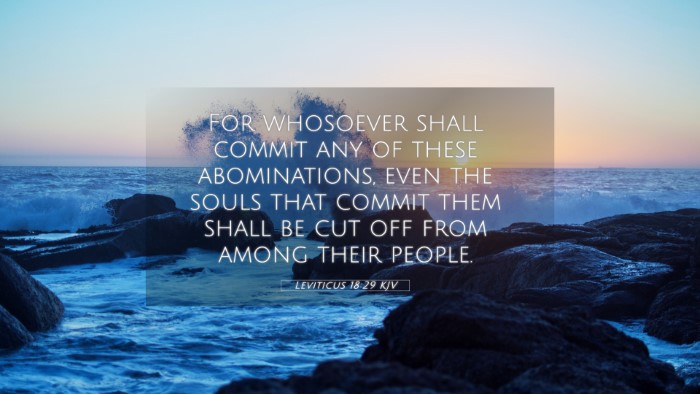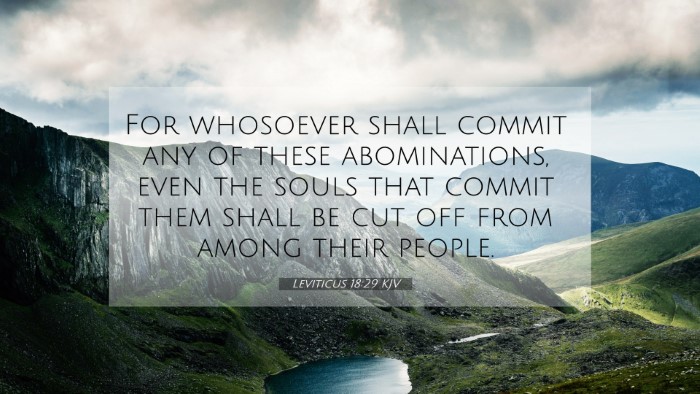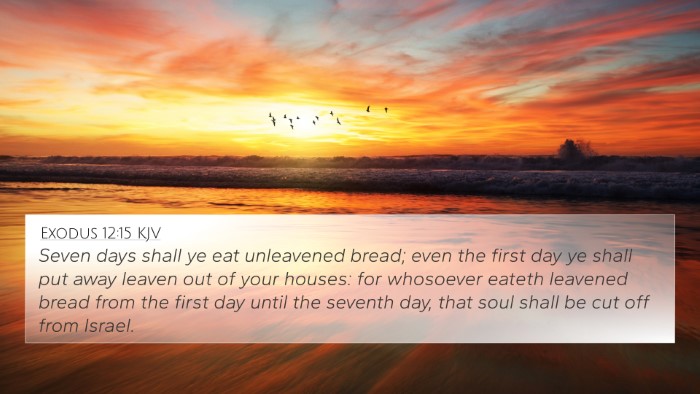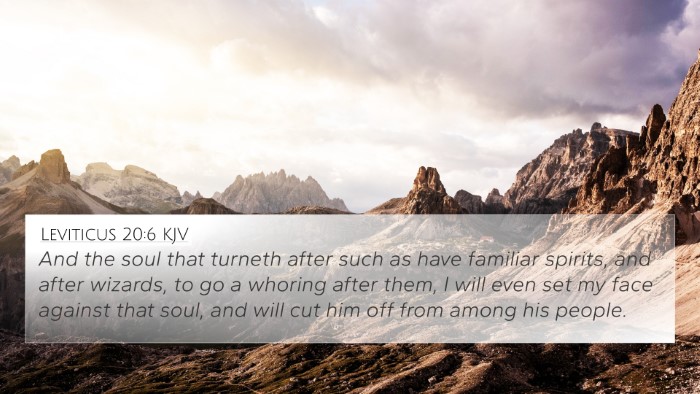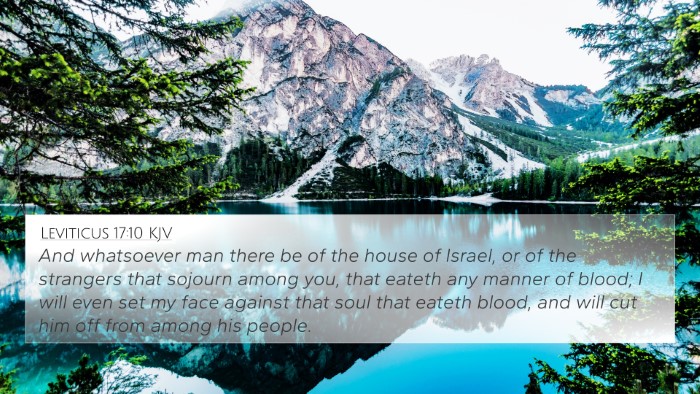Understanding Leviticus 18:29
Leviticus 18:29 states, "For everyone who does any of these abominations, the persons who do them shall be cut off from among their people." This verse serves as a crucial admonition regarding the consequences of engaging in moral and ritual transgressions as outlined in the laws of Moses.
Contextual Overview
This chapter of Leviticus addresses various illicit sexual relations, prohibitions against idolatry, and behavioral mandates for the Israelites. By emphasizing the need for holiness, the text highlights the importance of following God's commandments to maintain the covenantal relationship between God and His people.
Commentary Insights
-
Matthew Henry:
Henry emphasizes the serious nature of the sins listed prior to this verse and the resulting divine judgments. He points out that the phrase "cut off" symbolizes a severe separation from the community, reflecting alienation from God’s favor. This admonition against abominable practices serves to instill fear and hyper-awareness of their spiritual obligations.
-
Albert Barnes:
Barnes interprets the term "abominations" as actions that directly contravene the moral and ceremonial laws given to the Israelites. He underscores the significance of community and the repercussions of personal actions that disrupt the fabric of societal holiness.
-
Adam Clarke:
Clarke elaborates that the consequences of these actions are not merely earthly but also spiritual, leading to divine judgment. He posits that being "cut off" refers to exclusion from the covenant community and highlights the necessity for believers to lead lives in accordance with God's statutes to remain in fellowship with Him.
Thematic Connections
The themes found in Leviticus 18:29 resonate throughout the Bible, marking connections with various scriptures that address sin, community, and divine judgment. The following verses can be explored for a deeper biblical understanding:
- Numbers 15:30 - This verse also warns against presumptuous sin and the severe consequences faced by those who rebel against God's commands.
- Ezekiel 18:30 - A call to repentance and turning away from all offenses aligns well with the necessity for Israel to abstain from the wrongdoings in Leviticus.
- Romans 6:23 - This New Testament verse echoes the theme of sin and death, affirming that the wages of sin lead to spiritual death, similar to the 'cutting off' mentioned in Leviticus.
- Galatians 5:19-21 - Paul's list of works of the flesh reinforces the call to live a life pleasing to God, paralleling the moral injunctions in Leviticus.
- 1 Corinthians 6:9-10 - This passage serves as a modern reflection of the abominable acts listed in Leviticus and highlights a call for holiness among believers.
- Hebrews 10:26-27 - A warning against willful sin connects with the understanding of being cut off for continual, unrepentant sin.
- Matthew 5:30 - The extreme measures advocated in this New Testament verse reflect the seriousness of sin and its consequences, similar to the warnings in Leviticus.
Application for Today
For contemporary readers, Leviticus 18:29 serves as a reminder of the need for holiness and moral integrity within the context of community and personal faith. The concept of being “cut off” can be metaphorically applied to spiritual alienation that results from unrepentant sin.
Utilizing Cross-References in Bible Study
When diving deep into the implications of Leviticus 18:29, utilizing cross-referencing tools can enhance understanding:
- Bible Concordance: Helps identify related passages and themes throughout scripture.
- Cross-Reference Bible Study: Engaging with intertextual connections fosters a robust approach to understanding biblical themes.
- Bible Reference Resources: Employing comprehensive materials can provide insights into the continuity and development of scriptural principles.
Conclusion
In summary, Leviticus 18:29 highlights the seriousness of abominations and the resultant divine separation through a lens that resonates through scripture. The connections made with parallel verses underpin the gravity of moral living as it pertains to biblical faith. Understanding Leviticus through careful cross-referencing assists in drawing relevant connections that span both the Old and New Testaments, enriching one's theological insight and application in daily living.
